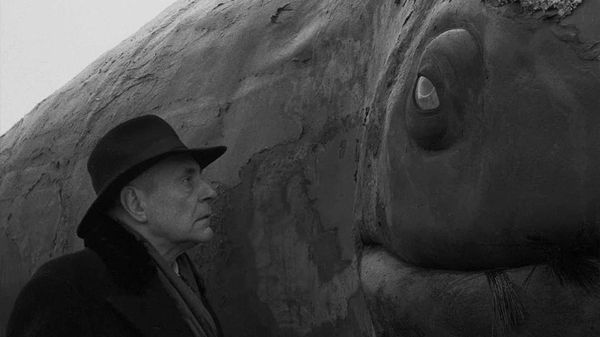Eye For Film >> Movies >> Werckmeister Harmonies (2000) Film Review

A fire burning in a hearth is extinguished.
This is the image with which Béla Tarr's Werckmeister Harmonies opens, and it is one that will recur, in one form or another, with some regularity throughout the film. Immediately after the flame is snuffed by the pub landlord to indicate closing time, protagonist János (Lars Rudolph) is granted a few more minutes to give his fellow drinkers a reassuring lesson in universal order - "an explanation that simple folks like us can also understand about immortality".

Arranging the bar's drunken stragglers in a lurching planetary dance with one cast as Sun, another as Earth and a third as Moon, János illustrates that the terror inspired by the sudden darkness of a lunar eclipse is quickly alleviated as the Sun's light returns – and as the landlord insists that all must now leave for the night, János points out to him: "It's still not over." After all, when the night is finished, another day will come, another fire will be lit, and so the harmony of the universe is forever maintained and renewed.
János' positive message is underlined by the very form of this opening sequence. The apparent dissonances involved in a group of staggering drunks re-enacting the cosmic order are lent unity not only by the unbroken single take (lasting some 10 minutes) that contains them – but also by the crisp black and white of the images, perfectly encapsulating János' theme of the eternal interplay between light and darkness. What is more, a tune quietly hummed by János as he choreographs the men is in perfect harmony with Mihály Vig's subdued piano score, even though the latter is entirely non-diegetic. And so, a comforting illusion of order is maintained, partnering form and content in their own well-tempered dance.
This illusion is about to be shattered. For as our inquisitive yet naïve hero works through the night delivering newspapers, a large circus trailer pulls into the dark streets, bringing with it a gigantic stuffed whale, a disfigured freak known as the Prince, and rumours of unrest, disorder and anarchy. Soon, along with the thick mist and bitter cold, fear itself has enveloped this quiet town in the Hungarian plain.
As János' musicologist 'uncle' György Eszter (Peter Fitz) articulates his theory on the false harmonies that riddle the Western scale system, men start gathering around the whale in the square, intent on overturning the established order – while György's estranged wife Tünde Eszter (Fassbinder veteran Hanna Schygulla) plots a crackdown no less destructive than the trouble it is designed to quell. Caught in the shadow of these violently opposed forces, János is about to discover that some lights, once put out, can never be returned to their full flame.
Lásló Krasznahorkai, novelist and long-time collaborator with Tarr, favours prose that ambles and meanders its way across the page, disorienting readers with its impenetrable density. Indeed, the opening sentence alone of his 1989 novel The Melancholy Of Resistance comprises no fewer than 174 words (in the English translation) – and subsequent sentences are similarly monumental in length. Accordingly, in adapting this novel as Werckmeister Harmonies, Tarr finds the perfect analogue for Krasznahorkai's prose style in his own love of majestic long takes.
The film may be 145 minutes, but that forbidding duration is split into a mere 38 shots, bringing to the film's day-and-a-half of events something like the eternity that Lájos tries to describe in the opening scene. In some takes, the camera simply tracks the protagonist along his many, increasingly frantic errands on foot through the town, while in others it ducks and weaves its way steadily through the pandemonium emerging all around – but there is always a graceful dance that imposes its own cinematographic rhythm and order on events that can otherwise seem to be spinning out of control.
Shot by a team of seven cinematographers, the film is a technical triumph – but to quote György Eszter's first words in the film: "I have to make it clear that not even for a moment is there a doubt that it is not a technical but a philosophical question."
If Werckmeister Harmonies is as monstrous and ungainly as the whale at its centre, it also shares the beast's power to inspire pity, fear and wonder, as Tarr unfolds his extraordinary parable in which a provincial municipality and its shabby denizens take on the aspect of more universal truths. Here cosmos and chaos, action and reaction, hope and despair, love and anger, all bump and grind together in a Satanic tango where every part of human experience, no matter how mundane, grotesque or abhorrent, is capable of being seen within a larger framework of creative order and divine/directorial harmony. So prepare to be amazed and unnerved, as Tarr's peculiar circus comes to town – but remember first to turn out the lights.
Reviewed on: 13 May 2009

















